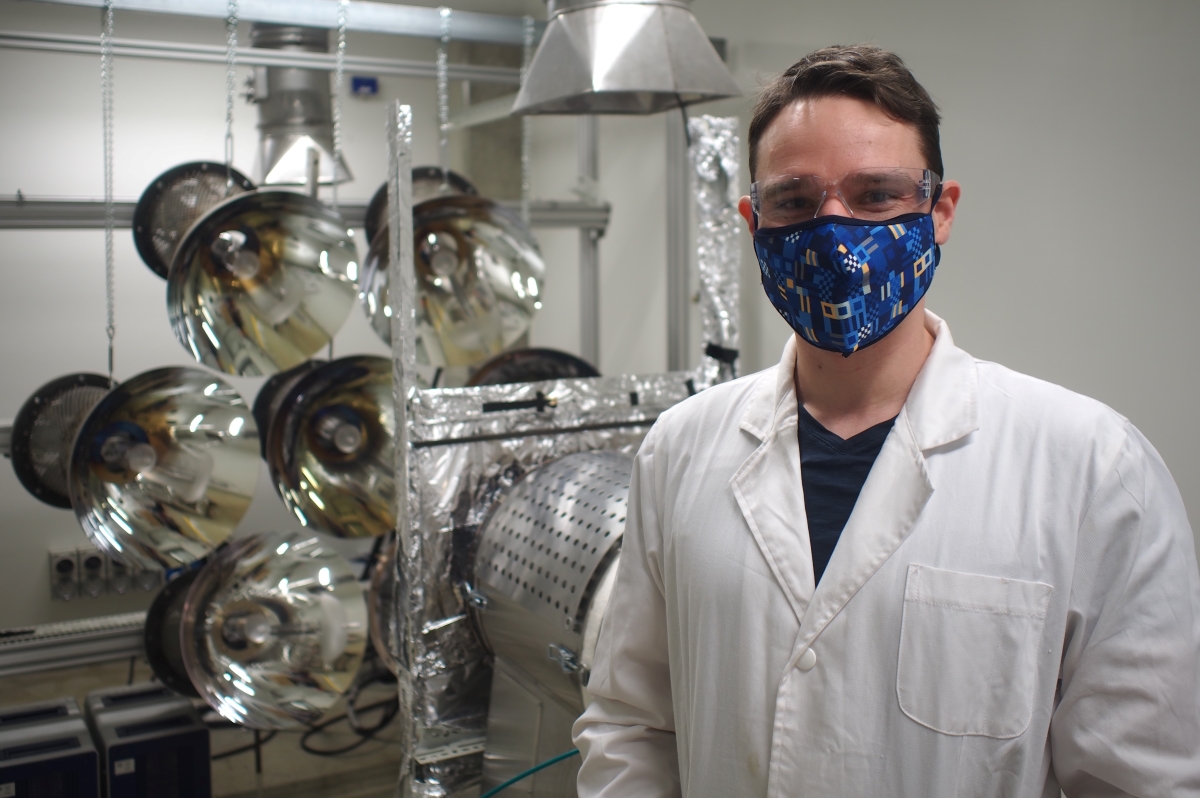Asia Pacific ‘Three Minute Thesis’ winner explores space construction

Matthew Shaw’s research explores how to extract metals from Moon rocks for space construction.
In summary
- Engineering PhD student and ‘extractive metallurgist’ Matthew Shaw has won the Asia Pacifc 2021 Three Minute Thesis (3MT) competition
- Shaw is researching how to overcome the harsh conditions in space to extract building material from Moon rocks
- He presented at the virtual 3MT finals, hosted by the University of Queensland, on 20 October
An enthusiastic ‘extractive metallurgist’ has won in the Asia-Pacific 3MT Final, hosted by the University of Queensland, on 20 October.
In his presentation ‘Lunacy’, Engineering PhD candidate Matthew Shaw breaks down his research into extracting metals from Moon rocks to construct large structures in space - an area he says has not been studied in detail before.
3MT entrants must present their research to a general audience in three minutes, with only a single slide as an aid.
‘Ever thought about building a house on the Moon? Flying a house up from Earth is way too expensive, so you need building materials,’ he says.
Current estimates show it costs about $35,000 per kilogram to take materials to the Moon.
Through his thesis, Matthew has explored the idea of extracting building materials - specifically metals - from Moon rocks by vaporising the rocks with concentrated sunlight to separate the metal from inside of them.
The thesis was born from Matthew’s experience working in the mining industry, where he was subject to harsh environments including more than 100 degrees Celsius temperature ranges.
It was developed with the help of his supervisors Professor Geoffrey Brooks, Professor Alan Duffy, Professor M Akbar Rhamdhani and CSIRO’s Dr Mark Pownceby.
‘It got me thinking a lot about the idea of working in even more extreme conditions, and space is nothing if not an extreme place.’
Each of the finalists presented a three-minute presentation outlining their thesis.
Over the moon
In addition to his own research, Matthew is part of the team at Swinburne’s Space Technology and Industry Institute, supervises undergraduate student research projects and mentors the high school students participating in the Swinburne Youth Space Innovation Challenge to send an experiment to the International Space Station.
‘The semi-finals and finals each year always have some amazing talks, so I’m just happy to represent Swinburne and the new Space Technology and Industry Institute on the big stage. We’ve got some really cool work going on here in terms of space resource processing and it’s fun to be able to present that,’ he says.
Dean of Graduate Research, Professor Georgina Kelly, hosted the Swinburne awards presentation, which was held virtually in July. She described 3MT as ‘the ultimate test of verbal communication skills for researchers.’
He has been awarded the first prize of a $5,000 research grant in addition to his prizes at the Swinburne competition: a $1,500 research grant and extra $500 for winning the ‘People’s Choice’ award, presented by Swinburne early career researcher program coordinator Associate Professor Stephane Shepherd.
The Swinburne award presentation was hosted by Dean of Graduate Research, Professor Georgina Kelly
An ‘outstanding’ presentation
Matthew says collaborating with other PhD students and working on ‘elevator pitches’ for the competition was rewarding. ‘Being able to present your technical work in an accessible way is a really great skill to learn, and the 3MT competition really helps with that,’ he says.
‘No matter how confident you are, there’s always that little niggling doubt that maybe you’re still kidding yourself, so the positive response from everyone and the judges was pretty special,’ he says.
Professor Kelly says that while all the presentations were ‘wonderful’, Matthew’s was ‘outstanding’.
‘He took a very technical topic and made it clear and relatable. His enthusiasm for the research shone through and grabbed the audience’s attention.’
-
Media Enquiries
Related articles
-

- Technology
- Science
- Engineering
Victorian students drive green energy transition through international hydrogen competition
Swinburne’s KIOSC, in collaboration with Horizon Educational and Gippsland Tech School, co-hosted the Hydrogen Grand Prix in Melbourne.Friday 26 July 2024 -

- Science
Skin, scales and fish tails: using collagen to turn fish guts into gold
New research from Swinburne could transform the sector by converting high value collagen proteins from seafood by-products into cosmetics, food, and pharmaceuticals.
Tuesday 02 July 2024 -

- Astronomy
High school students work with Swinburne astronomers on the future of space
Swinburne’s Youth Space Innovation Challenge has inspired over 330 Australian teenagers to pursue a career in STEM.
Friday 26 July 2024 -

- Education
- Engineering
Transforming the lives of refugee engineers through the EPIC Program
Swinburne has been partnering with the Level Crossing Removal Project (LXRP) on the Engineering Pathway Industry Cadetship (EPIC) program, helping refugee engineers gain international qualifications for the Australian workforce through an 18-month paid cadetship program.
Thursday 20 June 2024 -

- Science
- Engineering
Submarines in the future could self-identify cracks and self-heal thanks to Swinburne researcher
Thanks to the work of Dr Nisa Salim from Swinburne University of Technology’s School of Engineering, future submarines could self-identify microcracks and self-heal using a new kind of carbon fibre reinforced polymer composites.
Monday 17 June 2024

